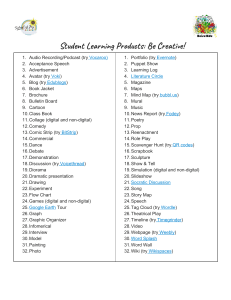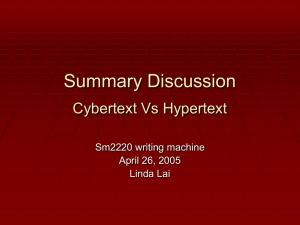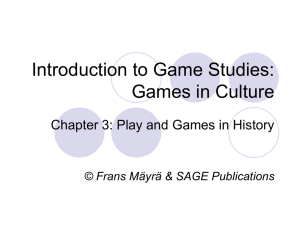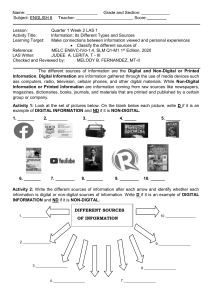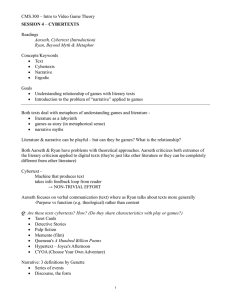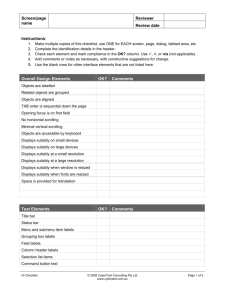COMPUTER GAME THEORY GAME ONTOLOGY… SESSION 2
advertisement
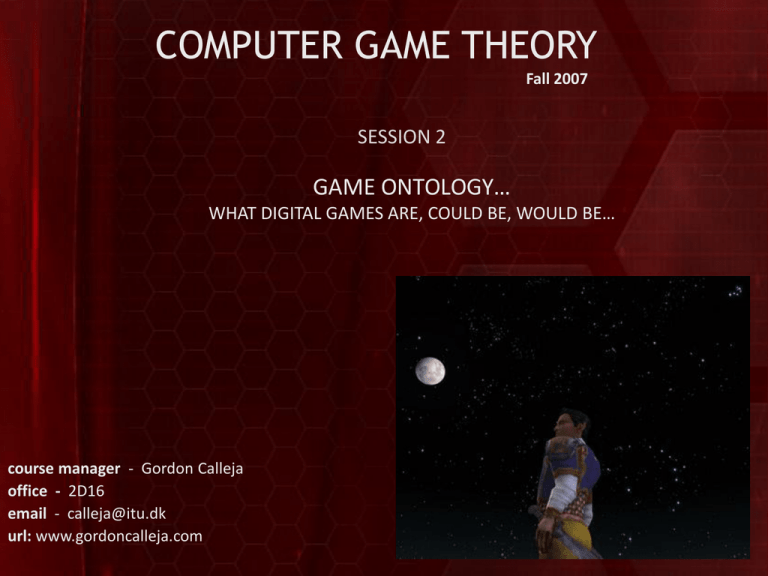
COMPUTER GAME THEORY Fall 2007 SESSION 2 GAME ONTOLOGY… WHAT DIGITAL GAMES ARE, COULD BE, WOULD BE… course manager - Gordon Calleja office - 2D16 email - calleja@itu.dk url: www.gordoncalleja.com Why are we here? One of the principal aims of this course is to develop a critical vocabulary that allows us to build a coherent analysis of any given game. The credibility of any analysis or critique is founded on the strength of its argument. Our personal preferences about any specific game is largely immaterial. What matters is our ability to analyse the game from a specific perspective with reference to previous and current research and communicate our analysis appropriately for our chosen audience (in our case an academic one). Which leads us to the most basic of questions asked OVER AND OVER again during the course of these lectures… What ARE games? Academics have conceptualised digital games as: the new Hollywood social environments new forms of art sources of addiction pedagogical tools breeding grounds for anti-sociality developers of violent attitudes a complete waste of time Or more sensibly (yet not necessarily accurate) new forms of: media texts narratives games! So WHAT are games???? A number of contemporary game theorists have addressed this question by devising a definition that caters for all forms of games, digital and otherwise. Do you think it is necessary to define games in order to understand them? Discuss in groups At this stage it would be helpful to look at attempts to define games. But before we see what academics have to say on the subject, let’s see what YOU think games are… Working in groups, and without looking at the course readings, list the characteristics that make games… games (digital or otherwise) and come up with a definition of games. During the exercise consider: Does your definition suit digital and non-digital games? Is it harder to create a definition that caters for digital and non-digital games, or not? What was the more challenging aspect of creating the definition? Now that you’ve come up with a great definition write it clearly and exchange it with the group opposite. Each group should now try to disprove the adversary group’s definition by finding (a) Analogue games that don’t fit the definition (b) Digital games that don’t fit the definition Game definitions Huizinga: A game is a free activity standing quite consciously outside “ordinary life” as being “not serious”, but at the same time absorbing the player intensely and utterly. It is an activity connected with no material interest, and no profit can be gained by it. It proceeds within its own proper boundaries of time and space according to the fixed rules and in an orderly manner. It promotes the formation of social groupings … Caillois: A game is an activity which is essentially free (voluntary), separate [in time and space], uncertain, unproductive, governed by rules, make-believe Meier: A game is a series of interesting choices Costikyan: A game is a form of art in which participants, termed players, make decisions in order to manage resources through game tokens in the pursuit of a goal Aarseth: (Digital Games are) games in virtual environments Salen & Zimmerman: A game is a system in which players engage in an artificial conflict, defined by rules, that results in a quantifiable outcome Juul: A game is a rule-based system with a variable and quantifiable outcome, where different outcomes are assigned different values, the player exerts effort in order to influence the outcome, the player feels emotionally attached to the outcome, and the consequences of the activity are negotiable Malaby: A game is a semi-bounded and socially legitimate domain of contrived contingency that generates inerpretable outcomes Using these definitions and others included in Juul and Salen & Zimmerman’s chapters, discuss (in groups) which definition you find most complete and write a few points explaining why Digital versus Analogue In all the above definitions we notice a struggle to accommodate digital games within definitions created for games in general. Are all digital games similar enough to classic games to be subsumed under one definition? How do games like Half-Life 2, Deus Ex, Stalker, World of Warcraft, Eve Online and other, contemporary digital games set in large 3D environments problematize definitions that work very well for non-digital games (card games, board games, sports) and digital games that simulate similar mechanics? Aarseth’s definition of digital games as “games in virtual environments” is particularly useful here. Pre-empting next week’s reading, have a think about this: should the analytical tools developed to understand non-digital games be wholly applicable to digital games? The Digital Game Framework (a.k.a. my two cents…) “We shall do better to think of a meaning as a plant that has grown – not a can that has been filled or a lump of clay that has been moulded” (Richards, 1936, 12). Cybertext and Ergodicity: The concept of cybertext focuses on the mechanical organization of the text, by positing the intricacies of the medium as an integral part of the literary exchange. However, it also centres attention on the consumer, or user, of the text, as a more integrated figure than even reader-response theorists would claim. The performance of their reader takes place all in his head, while the user of cybertext also performs in an extranoematic sense…This phenomenon I call ergodic, using a term appropriated from physics that derives from the Greek words ergon and hodos, meaning “work” and “path”. In ergodic literature, non-trivial effort is required to allow the reader to traverse the text (Aarseth, 1997, 1). This afternoon’s games: PONG http://www.pong-story.com/pcpong.htm SPACE INVADERS THE SIMS http://www.neave.com/games/invaders/ Afternoon Exercise : Choose one of the definitions/frameworks given in the readings or during the lesson and apply it to the games played this afternoon: Pong, Space Invaders and Sims. Discuss why you chose the definition and state whether it describes adequately each of the three games. The exercise should not be longer than a single A4 sheet and should be submitted to my office 2D13 by no later than noon, the coming Thursday. (Remember the game-lab is booked for your use on Wednesdays from 13:00 to 15:00 if you need to play the games further in order to complete the exercise) That’s all for today
